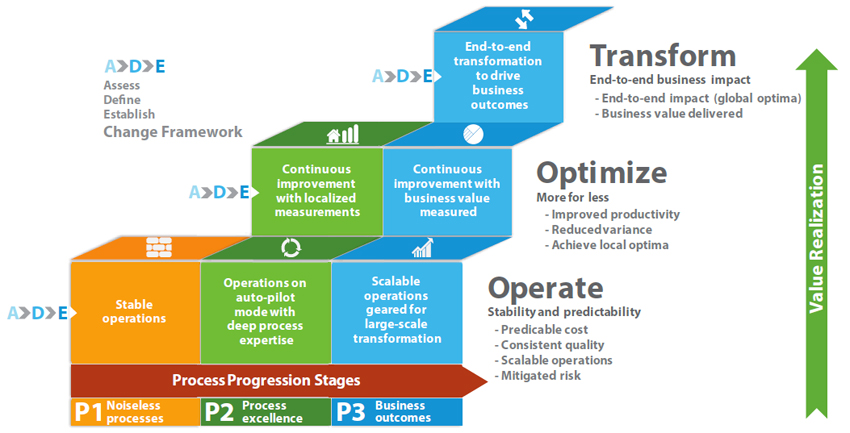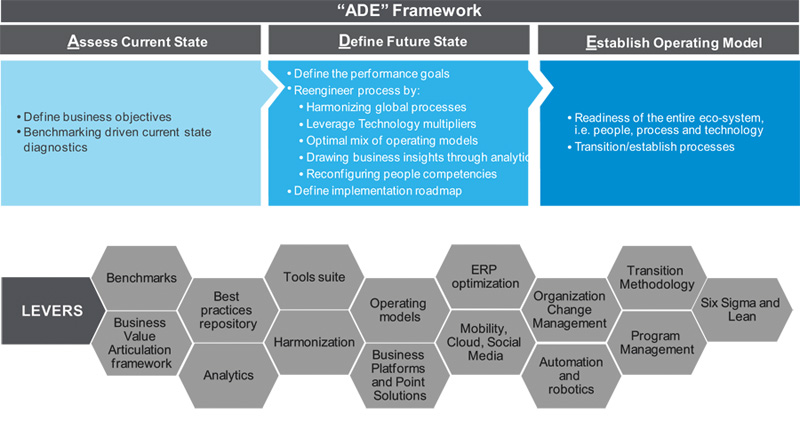Infosys BPM’s process progression model® (PPM)
A holistic model to transform business processes
Winning in today’s dynamic markets requires enterprises to be more agile. And this agility comes from having fluid business processes that can rapidly execute an enterprise’s business goals.
Processes across enterprise functions must be embedded with the capacity to respond to challenges and opportunities as and when they arise – whether it’s disruption, competition, or change in customer expectations. However, many enterprises find it difficult to achieve this state of operations because of inflexible processes, legacy technologies, and strategies that are not tailored to the unique requirements of different markets.
Fast-track your readiness for today’s realities, and gear up to take on tomorrow
Infosys BPM has been managing large and complex processes for more than 200 clients – across global locations and industries. Most of our clients have been with us for many years, and this multi-year view of engagements has given valuable insight into how transforming processes is key to transforming the business.
We realize that enterprises need a holistic framework that addresses evolving business process requirements – from design to delivery. That’s why we created the Process Progression Model® (PPM) to address the complete cycle of objectives of the three stages of progression of a business process – Operate, Optimize, and Transform.

PPM takes client processes on a journey of progression and continuous improvement. Irrespective of the existing state of the client process / industry / function, the model is geared to transform the process through an evolution curve of higher process maturity, measurable business outcomes, and enhanced client customer satisfaction. This is achieved by leveraging themes of effective service delivery, proficient workforce, knowledge management, automation, risk and compliance.
PPM is designed keeping in mind the complete cycle of Operate, Optimize, and Transform objectives of every business process. We believe that processes go through three stages of progression in a very systematic manner. And to get to each stage, our ‘Assess-Define-Establish (ADE) Framework' is deployed.
assess-define-establish (ADE) framework
PPM model is designed on the premise that processes progress towards the set goal in a staged manner, the three stages being:
- P1 - Noiseless processes
- P2 - Process excellence
- P3 - Business outcomes
Over the years, we have built a deep understanding of business processes and how they can be transformed. Each business situation is different and applying the right set of levers at each stage is critical to move to the next stage. Our ADE framework helps in identifying the levers that need to be applied to ‘change’ the process and advance it to the next stage.

Business impact
Best practices from more than 3,000 Six Sigma and Lean projects, Business Value Realization (BVR) case studies, transformation delivery models developed for specific clients are embedded into the PPM. Based on the transformation levers that are part of PPM – such as Quality, automation, BVR, etc. – we have delivered compelling benefits across our client base:
- More than US$ 400 million in savings realized in FY13 through the Business Management Practice
- US$ 135 million in savings realized from quality project implementations
- Reduced 2,000 FTEs across the various client engagements using various transformation levers
process progression model® (PPM) advantage
- A holistic model: Deployed through the entire lifecycle of the engagement, right from design to delivery
- Focus is on the end-to-end process: Designed to view businesses processes from an end-to-end perspective, cutting across geographies and functions
- Addresses diverse client requirements: Each business situation is unique and so is the business process – the model addresses this diverse need
- Helps zero-in on the right levers: Goals for each process is unique and the model identifies the right set of change levers that needs to be applied
- Transparent deployment: Complete and transparent view of the deployment and the process progression
Related reading
Brochure: Process Progression Model® (PPM)
Whitepaper: Process Progression Model: A holistic model to transform business process



